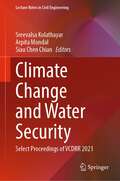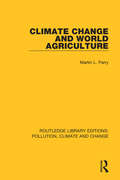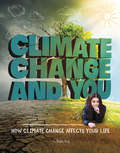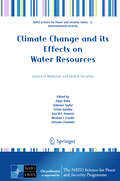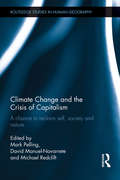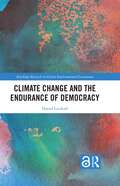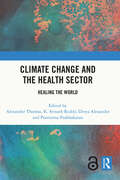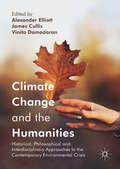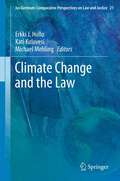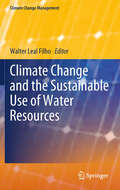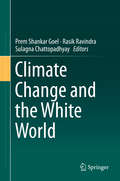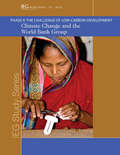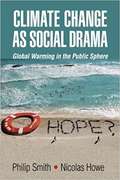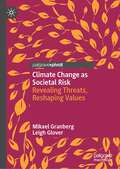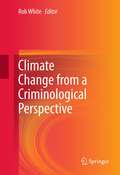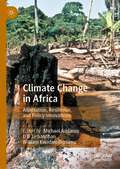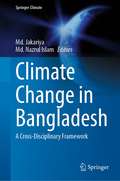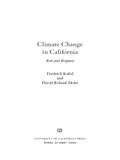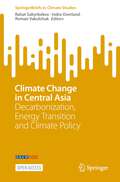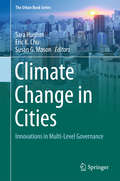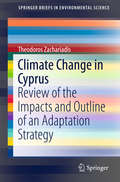- Table View
- List View
Climate Change and Water Security: Select Proceedings of VCDRR 2021 (Lecture Notes in Civil Engineering #178)
by Sreevalsa Kolathayar Siau Chen Chian Arpita MondalThis book presents the select proceedings of the Virtual Conference on Disaster Risk Reduction (VCDRR 2021). It emphasizes on the role of civil engineering for a disaster resilient society. It presents latest research on climate change and water security focusing on disaster risk reduction. Various topics covered in this book are climate change, stormwater management, flood risk analysis, drought management, water treatment, etc. This book is a comprehensive volume on disaster risk reduction (DRR) and its management for a sustainable built environment. This book is useful for the students, researchers, policy makers and professionals working in the area of civil engineering, climate change and disaster management.
Climate Change and World Agriculture
by Martin L. ParryOriginally published in 1990, this book analysed the sensitivity of the world food system and looked at the variety of ways in which it would be affected by climate change. It describes the effects of climate change on agriculture, estimates the impacts on plant and animal growth and looks at the geographical limits to different types of farming. It also considers the range of possible ways to adapt agriculture and so to mitigate the disastrous consequences of climate change.
Climate Change and You: How Climate Change Affects Your Life (Weather and Climate)
by Emily RaijWhy should you care about climate change? Weather affects your everyday life and climate change can have major impacts. Discover how scientists study climate change, what current research shows, and what you can do to reverse its effects.
Climate Change and its Effects on Water Resources: Issues of National and Global Security (NATO Science for Peace and Security Series C: Environmental Security)
by Alper Baba Antonio Chambel Gökmen Tayfur Ken W.F. Howard Michael J. Friedel Orhan GündüzNational and global security can be assessed in many ways but one underlying factor for all humanity is access to reliable sources of water for drinking, sanitation, food production and manufacturing industry. In many parts of the world, population growth and an escalating demand for water already threaten the sustainable management of available water supplies. Global warming, climate change and rising sea level are expected to intensify the resource sustainability issue in many water-stressed regions of the world by reducing the annual supply of renewable fresh water and promoting the intrusion of saline water into aquifers along sea coasts, where 50% of the global population reside. Pro-active resource management decisions are required, but such efforts would be futile unless reliable predictions can be made about the impact of the changing global conditions on the water cycle and the quality and availability of critical water reserves. Addressing this wide spectrum of issues, a team of expert authors discusses here the impacts of climate change on the global water resources, the long-term resource management goals at global and local scales, the data requirements and the scientific and technical advances necessary to mitigate the associated impacts.
Climate Change and the Course of Global History
by John L. BrookeClimate Change and the Course of Global History presents the first global study by a historian to fully integrate the earth-system approach of the new climate science with the material history of humanity. Part I argues that geological, environmental, and climatic history explain the pattern and pace of biological and human evolution. Part II explores the environmental circumstances of the rise of agriculture and the state in the Early and Mid-Holocene, and presents an analysis of human health from the Paleolithic through the rise of the state, including the Neolithic Demographic Transition. Part III introduces the problem of economic growth and examines the human condition in the Late Holocene from the Bronze Age through the Black Death, assessing the relationships among human technologies, climatic change, and epidemic disease. Part IV explores the move to modernity, stressing the emerging role of human economic and energy systems as earth-system agents in the Anthropocene. Supported by climatic, demographic, and economic data with forty-nine figures and tables custom-made for this book, A Rough Journey provides a pathbreaking model for historians of the environment, the world, and science, among many others.
Climate Change and the Crisis of Capitalism: A Chance to Reclaim, Self, Society and Nature (Routledge Studies in Human Geography)
by Mark Pelling Michael Redclift David Manuel-NavarreteAre established economic, social and political practices capable of dealing with the combined crises of climate change and the global economic system? Will falling back on the wisdoms that contributed to the crisis help us to find ways forward or simply reconfigure risk in another guise? This volume argues that the combination of global environmental change and global economic restructuring require a re-thinking of the priorities, processes and underlying values that shape contemporary development aspirations and policy. This volume brings together leading scholars to address these questions from several disciplinary perspectives: environmental sociology, human geography, international development, systems thinking, political sciences, philosophy, economics and policy/management science. The book is divided into four sections that examine contemporary development discourses and practices. It bridges geographical and disciplinary divides and includes chapters on innovative governance that confront unsustainable economic and environmental relations in both developing and developed contexts. It emphasises the ways in which dominant development paths have necessarily forced a separation of individuals from nature, but also from society and even from ‘self’. These three levels of alienation each form a thread that runs through the book. There are different levels and opportunities for a transition towards resilience, raising questions surrounding identity, governance and ecological management. This places resilience at the heart of the contemporary crisis of capitalism, and speaks to the relationship between the increasingly global forms of economic development and the difficulties in framing solutions to the environmental problems that carbon-based development brings in its wake.. Existing social science can help in not only identifying the challenges but also potential pathways for making change locally and in wider political, economic and cultural systems, but it must do so by identifying transitions out of carbon dependency and the kind of political challenges they imply for reflexive individuals and alternative community approaches to human security and wellbeing. Climate Change and the Crisis of Capitalism contains contributions from leading scholars to produce a rich and cohesive set of arguments, from a range of theoretical and empirical viewpoints. It analyses the problem of resilience under existing circumstances, but also goes beyond this to seek ways in which resilience can provide a better pathway and template for a more sustainable future. This volume will be of interest to both undergraduate and postgraduate students studying Human Geography, Environmental Policy, and Politics.
Climate Change and the Endurance of Democracy (Routledge Research in Global Environmental Governance)
by Daniel LindvallThis book explores the challenges climate change poses to the endurance of democracy, situating this theme within the context of the decline in global freedom documented since the early 21st century. It discusses how disaster events have historically affected human reasoning and agency and how the climate crisis is likely to influence democratic development in the future.Climate extreme events can provide opportunities for autocratic leaders to curtail rights and freedoms, but they can also create critical junctures where the social and political discourse within society is reshaped and where incumbent regimes are contested. The book illustrates how climate change may generate food insecurity, economic recessions and deepen socioeconomic inequalities. These effects may contribute to democratic backsliding but can also create new conditions for social mobilization. The democratic consequences of climate change are thus not primarily determined by the forces of nature, but by human responses and the social, economic and political conditions of the affected country. In the long-term perspective, however, climate change will have several negative effects on democratic stability. The book concludes that for human freedom and democracy to endure, modern society needs to be brought into balance with nature.This volume will be of great interest to students and scholars of climate governance, environmental politics, energy policy and global development.
Climate Change and the Health Sector: Healing the World
by Alexander Thomas K. Srinath Reddy Divya Alexander Poornima PrabhakaranThe health sector is known to be one of the major contributors towards the greenhouse gas emissions causing the climate crisis, the greatest health threat of the 21st century. This volume positions the health sector as a leader in the fight against climate change and explores the role of the health system in climate policy action. It delivers an overview of the linkages between climate change and the health sector, with chapters on the impact of climate change on health, its connection to pandemics, and its effects on food, nutrition and air quality, while examining gendered and other vulnerabilities. It delves into the different operational aspects of the health sector in India and details how each one can become climate-smart to reduce the health sector’s overall carbon footprint, by looking at sustainable procurement, green and resilient healthcare infrastructure, and the management of transportation, energy, water, waste, chemicals, pharmaceuticals and plastics in healthcare. Well supplemented with rigorous case studies, the book will be indispensable for students, teachers, and researchers of environmental studies, health sciences, and climate change. It will be useful for healthcare workers, public health officials, healthcare leaders, policy planners, and those interested in climate resilience and preparedness in the healthcare sector.
Climate Change and the Humanities: Historical, Philosophical and Interdisciplinary Approaches to the Contemporary Environmental Crisis
by Vinita Damodaran Alexander Elliott James CullisThis volume of essays fills a lacunae in the current climate change debate by bringing new perspectives on the role of humanities scholars within this debate. The humanities have historically played an important role in the various debates on environment, climate and society. The past two decades especially have seen a resurfacing of these environmental concerns across humanities disciplines in the wake of what has been termed climate change. This book argues that these disciplines should be more confident and vocal in responding to climate change while questioning the way in which the climate change debate is currently being conducted in academic, political and social arenas. Addressing climate change through the varied approaches of the humanities means re-thinking and re-evaluating its fundamental assumptions and responses to perceived crisis through the lens of history, philosophy and literature. The volume aims thus to be a catalyst for emerging scholarship in this field and to appeal to an academic and popular readership.
Climate Change and the Law (Ius Gentium: Comparative Perspectives on Law and Justice #21)
by Michael Mehling Kati Kulovesi Erkki J. HolloClimate Change and the Law is the first scholarly effort to systematically address doctrinal issues related to climate law as an emergent legal discipline. It assembles some of the most recognized experts in the field to identify relevant trends and common themes from a variety of geographic and professional perspectives. In a remarkably short time span, climate change has become deeply embedded in important areas of the law. As a global challenge calling for collective action, climate change has elicited substantial rulemaking at the international plane, percolating through the broader legal system to the regional, national and local levels. More than other areas of law, the normative and practical framework dedicated to climate change has embraced new instruments and softened traditional boundaries between formal and informal, public and private, substantive and procedural; so ubiquitous is the reach of relevant rules nowadays that scholars routinely devote attention to the intersection of climate change and more established fields of legal study, such as international trade law. Climate Change and the Law explores the rich diversity of international, regional, national, sub-national and transnational legal responses to climate change. Is climate law emerging as a new legal discipline? If so, what shared objectives and concepts define it? How does climate law relate to other areas of law? Such questions lie at the heart of this new book, whose thirty chapters cover doctrinal questions as well as a range of thematic and regional case studies. As Christiana Figueres, Executive Secretary of the United Nations Framework Convention on Climate Change (UNFCCC), states in her preface, these chapters collectively provide a "review of the emergence of a new discipline, its core principles and legal techniques, and its relationship and potential interaction with other disciplines."
Climate Change and the Sustainable Use of Water Resources (Climate Change Management)
by Walter Leal FilhoThe book explores the geo-chemical, physical, social and economic impacts of climate change on water supplies. It contains examples and case studies from a wide range of countries, and addresses the need to promote sustainable water use across the world.
Climate Change and the White World
by Rasik Ravindra Prem Shankar Goel Sulagna ChattopadhyayThis book showcases the results of studies pertaining to climate changes in the Polar Regions - Arctic-Antarctic-Himalaya. It discusses the significant variations due to thinning of sea ice in the Arctic, insights on the first Indian Arctic multi-sensor mooring (IndARC), political context of major geological and tectonic features of Arctic Ocean, climate change and its predicted impacts on fisheries and coastal communities. The book also contains the work pursued under the National Mission for Sustaining the Himalayan Ecosystems, aiming towards strengthening the capacities of farmers through appropriate Lab-to-Land intervention to combat climate change issues. Discussions on various models like WRF (Weather Research and Forecasting), Regional Climate Model (RegCM4) pertaining to Himalaya have been highlighted to gain more insights on climate change.
Climate Change and the World Bank Group
by The World BankThis study from the Independent Evaluation Group draws lessons for development and climate change mitigation from the World Bank Group's far-reaching portfolio of projects in energy, forestry, transport, coal power, and technology transfer. Reviewing what has worked, what hasn't, and why, the evaluation's key findings include: Energy efficiency can offer countries direct economic returns that dwarf those of most other development projects, while also reducing greenhouse gas emissions. Tropical forest protected areas, on average, significantly reduce tropical deforestation, preserving carbon and biodiversity. Deforestation rates are lower in areas that allowed sustainable use by local populations than in strictly protected areas. Deforestation rates were lowest of all in indigenous forest areas. For renewable energy projects, long-duration loans have been important in making projects financially viable.. But at prevailing carbon prices, carbon offset sales had little impact on most renewable energy projects' rate of returns, and did not address investors' need for up-front capital. Technology transfer - broadly understood to include diffusion of technical and financial innovations related to low-carbon development - has worked well when the logic of piloting and demonstration is well thought out, and when grants are used to mitigate the risk of pioneering efforts.
Climate Change as Social Drama
by Philip Smith Nicolas Howe Smith, Philip and Howe, NicolasClimate change is not just a scientific fact, nor merely a social and political problem. It is also a set of stories and characters that amount to a social drama. This drama, as much as hard scientific or political realities, shapes perception of the problem. Drs Smith and Howe use the perspective of cultural sociology and Aristotle's timeless theories about narrative and rhetoric to explore this meaningful and visible surface of climate change in the public sphere. Whereas most research wants to explain barriers to awareness, here we switch the agenda to look at the moments when global warming actually gets attention. Chapters consider struggles over apocalyptic scenarios, explain the success of Al Gore and An Inconvenient Truth, unpack the deeper social meanings of the climate conference and 'Climategate', critique failed advertising campaigns and climate art, and question the much touted transformative potential of natural disasters such as Superstorm Sandy.
Climate Change as Societal Risk: Revealing Threats, Reshaping Values
by Mikael Granberg Leigh GloverThis book analyzes climate change from a societal risk perspective, considering IPCC data, harm reduction, and global impact. Climate change is a globalised agent of social disruption whose impacts will worsen societal inequities and inequalities around the world. For some unfortunate societies already precariously exposed, climate change will tip them into societal collapse. Devastation will also occur to many ecological values in which all societies are embedded. But effective social action can limit the extent of these costs and losses. Ultimately, only social transformation can limit the social and environmental harms of climate change. But what does this mean? To what extent is society at risk? Are such risks particularized and restricted to specific segments and localities? Or is society at risk in a more universal way? Climate risks are re-shaping the practices of households, communities, governments and businesses. In this way, climate risks are a dynamic element in social change and social processes. Risk holds a mirror to society, revealing who and what is prioritized, recognized and valued. It also provides a reckoning of our perceived strengths, vulnerabilities and weaknesses. This volume examines how we understand the societal risks of contemporary and forecast climate change impacts—and those risks inherent in dealing with these impacts. We know that society is fashioning a new global climate—but climate change is also re-fashioning society; this book explores this dynamic process and considers its implications for future society.
Climate Change from a Criminological Perspective
by Rob WhiteFew would dispute the power of climate change to lead to profoundly destructive weather events. At the same time, the possibility of climate change as a consequence--or even a cause--of criminal events is far less recognized. As the earth grows warmer, issues regarding land use, water rights, bio-security, and food production and distribution will continue to have far-reaching impact, and produce more opportunity for offenses by individuals and groups as well as political and corporate entities. In Climate Change from a Criminological Perspective, a panel of pioneering green criminologists investigates an increasingly complex chain of ecological causes and effects. Illegal acts are analyzed as they contribute to environmental decline (e.g., wildlife poaching) or result from ecological distress (e.g., survival-related theft). Regulatory and other interventions are critiqued, concepts of environmental harm refined, and new research methodologies called for. And while individual events described are mainly local, the contributors keep the global picture, and substantial questions about human rights and social relationships, firmly in mind. Topics featured include: Global warming as corporate crime. Climate change and the courts: U.S. and global views. Climate change, natural disasters, and gender inequality. The roles and responsibilities of environmental enforcement networks. A sociocultural perspective on climate change denial. PLUS: instructive in-depth chapters on criminological aspects of Hurricane Katrina and the Japanese nuclear disaster. A volume of considerable timeliness and vision, Climate Change from a Criminological Perspective will be read and discussed, and will inspire action, by researchers in criminology, criminal justice, environmental studies, and related disciplines, as well as policymakers.
Climate Change from the Streets: How Conflict and Collaboration Strengthen the Environmental Justice Movement
by Michael MendezAn urgent and timely story of the contentious politics of incorporating environmental justice into global climate change policy Although the science of climate change is clear, policy decisions about how to respond to its effects remain contentious. Even when such decisions claim to be guided by objective knowledge, they are made and implemented through political institutions and relationships—and all the competing interests and power struggles that this implies. Michael Méndez tells a timely story of people, place, and power in the context of climate change and inequality. He explores the perspectives and influence low‑income people of color bring to their advocacy work on climate change. In California, activist groups have galvanized behind issues such as air pollution, poverty alleviation, and green jobs to advance equitable climate solutions at the local, state, and global levels. Arguing that environmental protection and improving public health are inextricably linked, Mendez contends that we must incorporate local knowledge, culture, and history into policymaking to fully address the global complexities of climate change and the real threats facing our local communities.
Climate Change in 2017: Implications for Business
by Rebecca Henderson Amram Migdal Sophus A Reinert Polina DekhtyarProfessors Rebecca M. Henderson and Sophus A. Reinert, Polina Dekhtyar (MBA 2016), and Case Researcher Amram Migdal (Case Research & Writing Group) prepared this note as the basis for class discussion.
Climate Change in Africa: Adaptation, Resilience, and Policy Innovations
by Michael Addaney D B Jarbandhan William Kwadwo DumenuThis edited collection chronicles the public policy responses to climate change and current and potential impacts that will affect critical and priority sectors within and across African countries now and in the coming decades. Contributions cover governance and policy responses to climate change, emphasizing continental governance and policy responses, national governance and policy responses (what selected countries in Africa are doing), and local or community policy and programmatic responses (what some selected major African communities are doing). Each chapter adopts multi-disciplinary and transdisciplinary approaches, combining insights from social and policy sciences, emphasizing existing gaps, particularly in the area of decision-making, governance and local climate action. The book offers both theoretical and practical contributions, with the aim of advancing academic discourse and thinking, policymaking and implementation of climate interventions in Africa.
Climate Change in Bangladesh: A Cross-Disciplinary Framework (Springer Climate)
by Md. Nazrul Islam Md. JakariyaThis book is a comprehensive resource for climate change impacts and scenarios on cross-cutting issues in Bangladesh and other tropical low-lying countries in Asia. The book promotes mitigation and adaptation strategies for learning and innovation to tackle climate change impacts, reduce inequality, as well as include changes in food, energy, health, education, and social protection policies in Bangladesh and Asian low-lying countries.Through several case studies, this book provides a powerful framework for identifying management tools and their applications in environment and governance including; climate change and natural hazards, climate change and energy framework, gender inequality and capacity building, and community participants and the actions needed to protect them.The aim of this book is to provide information to scientists, practitioners, academics, and government and non-government policy-makers to help them better understand the particularities of climate change adaptation and mitigation strategies for cross-cutting issues in Bangladesh.
Climate Change in California
by Fredrich J. Kahrl David W. Roland-HolstCalifornia is synonymous with opportunity, prosperity, and natural beauty, but climate change will certainly influence the state's future. Changes will affect the economy, natural resources, public health, agriculture, and the livelihoods of its residents. But how big is the risk? How will Californians adapt? What will it cost? This book is the first to ask and attempt to answer these and other questions so central to the long-term health of the state. While California is undeniably unique and diverse, the challenges it faces will be mirrored everywhere. This succinct and authoritative review of the latest evidence suggests feasible changes that can sustain prosperity, mitigate adverse impacts of climate change, and stimulate research and policy dialog across the globe. The authors argue that the sooner society recognizes the reality of climate change risk, the more effectively we can begin adaptation to limit costs to present and future generations. They show that climate risk presents a new opportunity for innovation, supporting aspirations for prosperity in a lower carbon, climate altered future where we can continue economic progress without endangering the environment and ourselves.
Climate Change in Central Asia: Decarbonization, Energy Transition and Climate Policy (SpringerBriefs in Climate Studies)
by Indra Overland Rahat Sabyrbekov Roman VakulchukThis open access book explores climate change impacts, adaptation, and mitigation in Central Asia and discusses policy options for the Central Asian governments. To address the urgent need for local scholarship on climate change in Central Asia, and in particular the need for more research by social scientists, this book features a wide range of contributions on climate change impacts, adaptation and mitigation in the region. Each chapter makes an important contribution to social science scholarship on climate change and decarbonization in Central Asia. Topics include decarbonization opportunities, carbon pricing instruments, the geo-economics of the energy transition, the relationship between human mobility and climate change. The book thus offers valuable insights for both academics and policymakers.
Climate Change in Cities: Innovations in Multi-Level Governance (The Urban Book Series)
by Sara Hughes Eric K. Chu Susan G. MasonThis book presents pioneering work on a range of innovative practices, experiments, and ideas that are becoming an integral part of urban climate change governance in the 21st century. Theoretically, the book builds on nearly two decades of scholarships identifying the emergence of new urban actors, spaces and political dynamics in response to climate change priorities. However, it further articulates and applies the concepts associated with urban climate change governance by bridging formerly disparate disciplines and approaches. Empirically, the chapters investigate new multi-level urban governance arrangements from around the world, and leverage the insights they provide for both theory and practice. Cities - both as political and material entities - are increasingly playing a critical role in shaping the trajectory and impacts of climate change action. However, their policy, planning, and governance responses to climate change are fraught with tension a nd contradictions. While on one hand local actors play a central role in designing institutions, infrastructures, and behaviors that drive decarbonization and adaptation to changing climatic conditions, their options and incentives are inextricably enmeshed within broader political and economic processes. Resolving these tensions and contradictions is likely to require innovative and multi-level approaches to governing climate change in the city: new interactions, new political actors, new ways of coordinating and mobilizing resources, and new frameworks and technical capacities for decision making. We focus explicitly on those innovations that produce new relationships between levels of government, between government and citizens, and among governments, the private sector, and transnational and civil society actors. A more comprehensive understanding is needed of the innovative approaches being used to navigate the complex networks and relationships that constitute contemporary multi-level urban climate change governance. Debra Roberts, Co-Chair, Working Group II, IPCC 6th Assessment Report (AR6) and Acting Head, Sustainable and Resilient City Initiatives, Durban, South Africa "Climate Change in Cities offers a refreshingly frank view of how complex cities and city processes really are. " Christopher Gore, Associate Professor and Chair, Department of Politics and Public Administration, Ryerson University, Canada "This book is a rare and welcome contribution engaging critically with questions about cities as central actors in multilevel climate governance but it does so recognizing that there are lessons from cities in both the Global North and South. " Harriet Bulkeley, Professor of Geography, Durham University, United Kingdom "This timely collection provides new insights into how cities can put their rhetoric into action on the ground and explores just how this promise can be realised in cities across the world - from California to Canada, India to Indonesia. "
Climate Change in Cyprus: Review of the Impacts and Outline of an Adaptation Strategy (SpringerBriefs in Environmental Science)
by Theodoros ZachariadisThis book providesa concise overview of facts and projections aboutclimate change in Cyprus and its region until the end of the 21st century. Climate change is expected to have adverse effects in Mediterranean Europe - the most serious compared to other European regions. Being an island state with a semi-arid climate in the Eastern Mediterranean, Cyprus is located in a hot spot. Basedon the information available in the literature, it highlights the expected natural, economic and societal impacts ofclimate change and presents recommendations forthe implementation of a nationaladaptation strategy. Despite the dismal outlook arising from this review,the book demonstrates that coping with climate change is possible, provided thatproactive actions are taken by both the public and the private sector. Publicauthorities need to set clear priorities and set up adequate monitoringmechanisms that can help avoid large natural and economic damages at a laterstage. Enabling private adaptation investments and properly pricing the use ofnatural resources are key priorities for investing in a climate resilienteconomy.
Climate Change in Deserts
by Martin WilliamsThis book reconstructs climatic changes in deserts and their margins at a variety of scales in space and time. It draws upon evidence from land and sea, including desert dunes, wind-blown dust, river and lake sediments, glacial moraines, plant and animal fossils, isotope geochemistry, speleothems, soils, and prehistoric archaeology. The book summarises the Cenozoic evolution of the major deserts of the Americas, Eurasia, Africa and Australia and the causes of historic floods and droughts. The book then considers the causes and consequences of desertification and proposes four key conditions for achieving ecologically sustainable use of natural resources in arid and semi-arid areas. Climate Change in Deserts is an invaluable reference for researchers and advanced students interested in the climate and geomorphology of deserts: geographers, geologists, ecologists, archaeologists, soil scientists, hydrologists, climatologists and natural resource managers.
